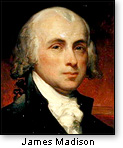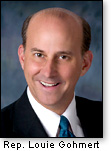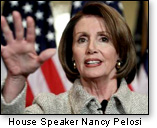
Wes Vernon
D.C. as a boomtown tax-free zone - - a role model for national recovery?
By Wes Vernon
This column reiterates its proposal to grant the citizens of the District of Columbia exemption from paying the federal income taxes that the rest of us pay. I know the populist inclination to say Washington takes enough of our money already; so why not let them get a taste of their own medicine. But we're talking about citizens living in the city permanently — not the federal officials staying there temporarily while maintaining a legal residence and paying taxes in their home states.
 What ought not to be a law...
What ought not to be a law...
As of this writing, Congress is about to bring to final passage an unconstitutional bill and send it to the White House, where President Obama is likely to sign the proposal into law. It would grant D.C. a voting member of the House of Representatives.
Oath of office violated?
Both the president and the members of Congress have sworn to uphold the Constitution of the United States.
Article 1, Section 2, of the Constitution reads, "The House of Representatives shall be composed of Members chosen every second year by the People of the several States [emphasis added]..."
By any rational definition — legal or just plain horse sense — Washington, D.C., is a city — not a state. For over 200 years, it has been regarded as a city because — well, it is one, and always has been — albeit a stand-alone city, unlike other cities in the U.S. that are parts of their respective states. There is a reason why Washington was accorded that status (about which more anon).
There is a remedy for D.C. to gain voting rights in Congress. It is clearly laid out — again — in the Constitution. And that is for Congress to approve a Voting Rights proposal as an amendment to the Constitution. This requires ratification by three-fourths of the states in the union. In the seventies, such an amendment was in fact sent to the states. It would have declared Washington, D.C., to be a state. Only 16 states ratified, far short of the 38 that were required (or 39 depending on how you split the math).
A matter of semantics, no?
 Those now pushing for D.C. statehood will not let little things like the Constitution get in the way of their goals. So now, having been rebuffed by the states, they're saying oh well, never mind, we'll just say D.C. is the "functional equivalent of a state."
Those now pushing for D.C. statehood will not let little things like the Constitution get in the way of their goals. So now, having been rebuffed by the states, they're saying oh well, never mind, we'll just say D.C. is the "functional equivalent of a state."
Alas, if their goal required a declaration that the cow jumped over the moon, these folks would so declare. Failing the smell test concerns them not in the least.
Why?
At first blush, anyone not familiar with the background and the history involved would have a perfectly logical reason to say, "Why can't the people of D.C. have a vote in Congress?
Glad you asked that.
The history
The Founders were cognizant of mischief local governments could do to "the [national] public authority"... whose proceedings "might be interrupted with impunity" (James Madison's words). They were concerned lest "a dependence of [the Federal government] on [the local government] might" mean — in plain 21st century English — that the locals, as the hosts, would have the Feds over a barrel, and might bring disproportionate influence to bear on federal policies that were to the disadvantage of the rest of the country. (For Madison's precise language, see this column "Taxation Without Representation?" — April 2, 2007.)
have the Feds over a barrel, and might bring disproportionate influence to bear on federal policies that were to the disadvantage of the rest of the country. (For Madison's precise language, see this column "Taxation Without Representation?" — April 2, 2007.)
To recap
This was not scare talk, but was based on some experience. In 1783, when the seat of government was in Philadelphia, angry unpaid soldiers in the Revolutionary War marched on Congress and were "menacing Congress in Independence Hall itself." The state of Pennsylvania sat on its hands and refused to intervene in the interest of order. Members of the Congress of the United States were forced to flee to New Jersey.
That's when the Founders said in effect, that's it! We need a "federal town," as the seat of government over which the feds will exercise complete control.
Concessions, but even today...
Although still under federal jurisdiction, in recent decades D.C. has been given the right to elect its own mayor, city council, and school board. Also in 1961, its citizens were granted the right to participate in electing a president, but with no vote in Congress. Again — the Constitution forbids it. D.C. does have a non-voting Delegate in the House of Representatives
And BTW, even under federal control (Congressional committees that deal with nothing but D.C. business and the purse strings involved), one could argue that in a nonviolent way (as opposed to 1783), the locals still have disproportionate influence on federal business.
They supply the jury pool for some of the most important and/or publicized federal cases. Washington, D.C.'s federal juries have been notoriously biased in some high-profile verdicts with ramifications related to federal business. In its own way, that seems to fly in the face of Madison's warnings.
Now about the solution
Again, this column proposes that Congress — instead of violating the Constitution — should nonetheless address the local complaint about "taxation without representation."
 So how about making D.C. a tax-free zone? Exempt its residents from paying all federal income taxes, capital gains taxes, and corporate taxes? Think of the local jobs that would create. In the current nationwide down economy, Washington D.C., the nation's capital, would be a role model — i.e., lower taxes = prosperity. (Note: I live in nearby Maryland, so this would not affect me.)
So how about making D.C. a tax-free zone? Exempt its residents from paying all federal income taxes, capital gains taxes, and corporate taxes? Think of the local jobs that would create. In the current nationwide down economy, Washington D.C., the nation's capital, would be a role model — i.e., lower taxes = prosperity. (Note: I live in nearby Maryland, so this would not affect me.)
New support
Comes now Rep. Louie Gohmert (R-Tex.) to put the essence of that idea into legislation, albeit on a more modest scale than ours. Mr. Gohmert's bill would exclude District residents from paying a federal income tax on the money they earn in the District.
All right, that beats any other bill that's on the table. We would sign onto it in a minute.
But of course, not the Washington Post.
"Aside from the practical problems of this proposal," intones the voice of Washington's liberal establishment, "do we really want to turn the nation's capital into a tax haven for the rich?"
Ah, yes! Trust the denizens of Washington's high-rent Georgetown neighborhood to bemoan the evil rich. They've made their pile of money (directly or indirectly) off government (the bigger the better). And God forbid that anyone outside their Beltway circle comes here and actually makes a buck by investing and creating real jobs for real people. (Most D.C. residents can't afford nannies or private schools.)
As a come-on to Republicans, the Voting Rights bill would combine the seat for lock-solid Democrat D.C. with a new seat for Republican-leaning Utah. That won't wash. Utah — being a state — is constitutionally entitled to a fourth seat in the House. D.C. — being a city and not a state — is not entitled to a voting representative in the House. Utah should not be held hostage to a violation of the Constitution.
The real reason?
 Gohmert's bill has no chance in Nancy Pelosi's House. And here's why:
Gohmert's bill has no chance in Nancy Pelosi's House. And here's why:
If D.C. becomes a tax-free boomtown — while the rest of the country struggles to find ways to spend "stimulus" money in an effort to create jobs that last until the money runs out (as happened during the New Deal) — then what happens?
Yes, President Obama becomes the proverbial emperor with no clothes, but it's more than that. It puts to rest forever the notion that tax cuts benefit only "the rich."
Ahem! Can't have that, can we?
© Wes Vernon
February 23, 2009
This column reiterates its proposal to grant the citizens of the District of Columbia exemption from paying the federal income taxes that the rest of us pay. I know the populist inclination to say Washington takes enough of our money already; so why not let them get a taste of their own medicine. But we're talking about citizens living in the city permanently — not the federal officials staying there temporarily while maintaining a legal residence and paying taxes in their home states.
 What ought not to be a law...
What ought not to be a law...As of this writing, Congress is about to bring to final passage an unconstitutional bill and send it to the White House, where President Obama is likely to sign the proposal into law. It would grant D.C. a voting member of the House of Representatives.
Oath of office violated?
Both the president and the members of Congress have sworn to uphold the Constitution of the United States.
Article 1, Section 2, of the Constitution reads, "The House of Representatives shall be composed of Members chosen every second year by the People of the several States [emphasis added]..."
By any rational definition — legal or just plain horse sense — Washington, D.C., is a city — not a state. For over 200 years, it has been regarded as a city because — well, it is one, and always has been — albeit a stand-alone city, unlike other cities in the U.S. that are parts of their respective states. There is a reason why Washington was accorded that status (about which more anon).
There is a remedy for D.C. to gain voting rights in Congress. It is clearly laid out — again — in the Constitution. And that is for Congress to approve a Voting Rights proposal as an amendment to the Constitution. This requires ratification by three-fourths of the states in the union. In the seventies, such an amendment was in fact sent to the states. It would have declared Washington, D.C., to be a state. Only 16 states ratified, far short of the 38 that were required (or 39 depending on how you split the math).
A matter of semantics, no?
 Those now pushing for D.C. statehood will not let little things like the Constitution get in the way of their goals. So now, having been rebuffed by the states, they're saying oh well, never mind, we'll just say D.C. is the "functional equivalent of a state."
Those now pushing for D.C. statehood will not let little things like the Constitution get in the way of their goals. So now, having been rebuffed by the states, they're saying oh well, never mind, we'll just say D.C. is the "functional equivalent of a state."Alas, if their goal required a declaration that the cow jumped over the moon, these folks would so declare. Failing the smell test concerns them not in the least.
Why?
At first blush, anyone not familiar with the background and the history involved would have a perfectly logical reason to say, "Why can't the people of D.C. have a vote in Congress?
Glad you asked that.
The history
The Founders were cognizant of mischief local governments could do to "the [national] public authority"... whose proceedings "might be interrupted with impunity" (James Madison's words). They were concerned lest "a dependence of [the Federal government] on [the local government] might" mean — in plain 21st century English — that the locals, as the hosts, would
 have the Feds over a barrel, and might bring disproportionate influence to bear on federal policies that were to the disadvantage of the rest of the country. (For Madison's precise language, see this column "Taxation Without Representation?" — April 2, 2007.)
have the Feds over a barrel, and might bring disproportionate influence to bear on federal policies that were to the disadvantage of the rest of the country. (For Madison's precise language, see this column "Taxation Without Representation?" — April 2, 2007.)To recap
This was not scare talk, but was based on some experience. In 1783, when the seat of government was in Philadelphia, angry unpaid soldiers in the Revolutionary War marched on Congress and were "menacing Congress in Independence Hall itself." The state of Pennsylvania sat on its hands and refused to intervene in the interest of order. Members of the Congress of the United States were forced to flee to New Jersey.
That's when the Founders said in effect, that's it! We need a "federal town," as the seat of government over which the feds will exercise complete control.
Concessions, but even today...
Although still under federal jurisdiction, in recent decades D.C. has been given the right to elect its own mayor, city council, and school board. Also in 1961, its citizens were granted the right to participate in electing a president, but with no vote in Congress. Again — the Constitution forbids it. D.C. does have a non-voting Delegate in the House of Representatives
And BTW, even under federal control (Congressional committees that deal with nothing but D.C. business and the purse strings involved), one could argue that in a nonviolent way (as opposed to 1783), the locals still have disproportionate influence on federal business.
They supply the jury pool for some of the most important and/or publicized federal cases. Washington, D.C.'s federal juries have been notoriously biased in some high-profile verdicts with ramifications related to federal business. In its own way, that seems to fly in the face of Madison's warnings.
Now about the solution
Again, this column proposes that Congress — instead of violating the Constitution — should nonetheless address the local complaint about "taxation without representation."
 So how about making D.C. a tax-free zone? Exempt its residents from paying all federal income taxes, capital gains taxes, and corporate taxes? Think of the local jobs that would create. In the current nationwide down economy, Washington D.C., the nation's capital, would be a role model — i.e., lower taxes = prosperity. (Note: I live in nearby Maryland, so this would not affect me.)
So how about making D.C. a tax-free zone? Exempt its residents from paying all federal income taxes, capital gains taxes, and corporate taxes? Think of the local jobs that would create. In the current nationwide down economy, Washington D.C., the nation's capital, would be a role model — i.e., lower taxes = prosperity. (Note: I live in nearby Maryland, so this would not affect me.)New support
Comes now Rep. Louie Gohmert (R-Tex.) to put the essence of that idea into legislation, albeit on a more modest scale than ours. Mr. Gohmert's bill would exclude District residents from paying a federal income tax on the money they earn in the District.
All right, that beats any other bill that's on the table. We would sign onto it in a minute.
But of course, not the Washington Post.
"Aside from the practical problems of this proposal," intones the voice of Washington's liberal establishment, "do we really want to turn the nation's capital into a tax haven for the rich?"
Ah, yes! Trust the denizens of Washington's high-rent Georgetown neighborhood to bemoan the evil rich. They've made their pile of money (directly or indirectly) off government (the bigger the better). And God forbid that anyone outside their Beltway circle comes here and actually makes a buck by investing and creating real jobs for real people. (Most D.C. residents can't afford nannies or private schools.)
As a come-on to Republicans, the Voting Rights bill would combine the seat for lock-solid Democrat D.C. with a new seat for Republican-leaning Utah. That won't wash. Utah — being a state — is constitutionally entitled to a fourth seat in the House. D.C. — being a city and not a state — is not entitled to a voting representative in the House. Utah should not be held hostage to a violation of the Constitution.
The real reason?
 Gohmert's bill has no chance in Nancy Pelosi's House. And here's why:
Gohmert's bill has no chance in Nancy Pelosi's House. And here's why:If D.C. becomes a tax-free boomtown — while the rest of the country struggles to find ways to spend "stimulus" money in an effort to create jobs that last until the money runs out (as happened during the New Deal) — then what happens?
Yes, President Obama becomes the proverbial emperor with no clothes, but it's more than that. It puts to rest forever the notion that tax cuts benefit only "the rich."
Ahem! Can't have that, can we?
© Wes Vernon
The views expressed by RenewAmerica columnists are their own and do not necessarily reflect the position of RenewAmerica or its affiliates.
(See RenewAmerica's publishing standards.)



















